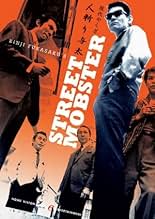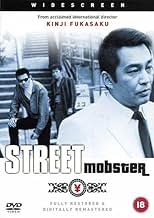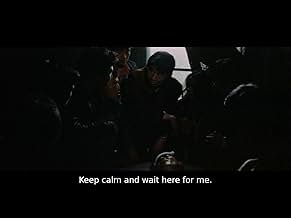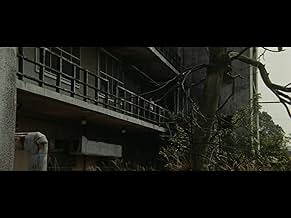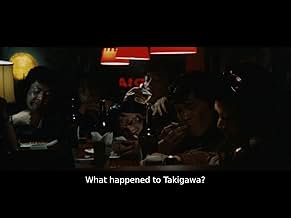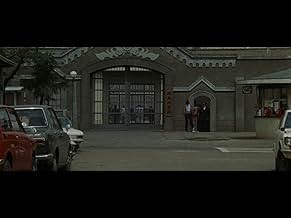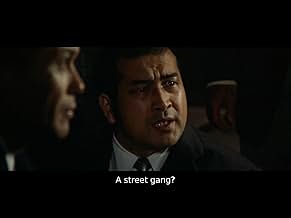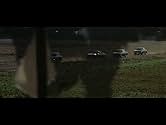AVALIAÇÃO DA IMDb
7,1/10
1,3 mil
SUA AVALIAÇÃO
Adicionar um enredo no seu idiomaA yakuza, who has an untamed rage and lack of respect for authority, finds himself leading the remnants of the gang he once belonged to in order to secure an area of their own.A yakuza, who has an untamed rage and lack of respect for authority, finds himself leading the remnants of the gang he once belonged to in order to secure an area of their own.A yakuza, who has an untamed rage and lack of respect for authority, finds himself leading the remnants of the gang he once belonged to in order to secure an area of their own.
- Direção
- Roteiristas
- Artistas
- Direção
- Roteiristas
- Elenco e equipe completos
- Produção, bilheteria e muito mais no IMDbPro
Avaliações em destaque
This has a similar look to some of the early 70s New York gangster and Blaxploitation flicks, only with an eye for the big moody shadows that wouldn't be out of place in a Carol Reed movie. The acting is pretty good, even when the hero is tired and emotional, and the few characters that are fleshed out are never let down by the script. It's easy to see how Riki Takeuchi and Takashi Miike misspent their youth. I wouldn't go so far as to call it a classic, but it compares very favourably with the the best of its era.
The twang of the jaws harp and the jarring off-key harmonica are a nod in the direction of Ennio Morricone. The hyper realism (and melodrama)is very much of its day. Think of Larry Cohen, Sergio Leone, Roman Polanski, Sergio Corbucci, Sam Fuller, Sam Peckinpah, Don Siegel, and their ilk in the 60s and 70s, and accept that film has always been an international conspiracy by artists with attitude. Audiences may be isolated by language, but filmmakers are interested in the visual aspects, and they don't need translation, only an understanding of technique. Kurosawa and Mishima opened up Japanese cinema to the world, and Japanese film makers responded by drawing influences from the wider world.
This movie takes the technical influences and extrapolates them into the boom years of the Japanese economy. Where's there's money, there's organised crime. The casual unaffiliated street punk was a dying breed in the 70s. It's noticeable that the "punks" don't wear suits. They look more like refugees from the beatnik era, and the jazzy sections of the score (that accompany their drunken good times) seem to be saying that their day is done. Kinji Fukasaku is as deserving of credit as any of the aforementioned masters of pulp. His eye is true, and whenever he has a decent script, he makes a good or a great movie, usually on a tight budget. Who could ask for more?
The twang of the jaws harp and the jarring off-key harmonica are a nod in the direction of Ennio Morricone. The hyper realism (and melodrama)is very much of its day. Think of Larry Cohen, Sergio Leone, Roman Polanski, Sergio Corbucci, Sam Fuller, Sam Peckinpah, Don Siegel, and their ilk in the 60s and 70s, and accept that film has always been an international conspiracy by artists with attitude. Audiences may be isolated by language, but filmmakers are interested in the visual aspects, and they don't need translation, only an understanding of technique. Kurosawa and Mishima opened up Japanese cinema to the world, and Japanese film makers responded by drawing influences from the wider world.
This movie takes the technical influences and extrapolates them into the boom years of the Japanese economy. Where's there's money, there's organised crime. The casual unaffiliated street punk was a dying breed in the 70s. It's noticeable that the "punks" don't wear suits. They look more like refugees from the beatnik era, and the jazzy sections of the score (that accompany their drunken good times) seem to be saying that their day is done. Kinji Fukasaku is as deserving of credit as any of the aforementioned masters of pulp. His eye is true, and whenever he has a decent script, he makes a good or a great movie, usually on a tight budget. Who could ask for more?
As can be expected from Japanese master Kinji Fukasaku, "Street Mobster" is a fast paced, stylistic and violent depiction of a low level Yakuza thug who punches to the beat of his own fist.
Bunta Sugawara plays Okita, a small time hood recently released from prison. Upon his arrival to the outside world, he finds the underworld he left behind changed. A new crew runs his old stomping grounds, and he is lost and abandoned. After teaming up with some hoodlums, Okita sets his sights on bigger things, which all leads to his downward spiral in the Japanese underworld.
Fukasaku directs this Yakuza flick with his usual visual tour de force. You can expect freeze frames, quick cuts, fast zooms, hand- held camera work, dutch angles, voice overs, a mixture of b&w and color cinematography, etc. The energy that the director supplies from behind the camera perfectly captures the momentum in which the lead characters react to their daily lives. There is a lot of action, with characters often breaking out into fights and chases at random. This kind of film needs to be taken with a grain of salt. The violence, like the melodrama and tacked on love interest, are over the top but enjoyable.
So sit back and relax. This lean, mean, fast flying fist machine of a film will keep you entertained and enthralled throughout.
Bunta Sugawara plays Okita, a small time hood recently released from prison. Upon his arrival to the outside world, he finds the underworld he left behind changed. A new crew runs his old stomping grounds, and he is lost and abandoned. After teaming up with some hoodlums, Okita sets his sights on bigger things, which all leads to his downward spiral in the Japanese underworld.
Fukasaku directs this Yakuza flick with his usual visual tour de force. You can expect freeze frames, quick cuts, fast zooms, hand- held camera work, dutch angles, voice overs, a mixture of b&w and color cinematography, etc. The energy that the director supplies from behind the camera perfectly captures the momentum in which the lead characters react to their daily lives. There is a lot of action, with characters often breaking out into fights and chases at random. This kind of film needs to be taken with a grain of salt. The violence, like the melodrama and tacked on love interest, are over the top but enjoyable.
So sit back and relax. This lean, mean, fast flying fist machine of a film will keep you entertained and enthralled throughout.
The proud, self-destructive, punk/anti-hero violates national boundaries without compunction in late 60s/early 70s cinema. Here Isamu Okita (Bunta Sugawara), often simply called "Bro", is reminiscent not only of Alex (A Clockwork Orange) but also of Ivan (The Harder They Come), Johnny Boy (Mean Streets) and even of Michel (À bout de soufflé).
'Gendai yakuza: hito-kiri yota' (which, in English, apparently means something like Outlaw Killer or Street Mobster) is a restless, prowling movie that occasionally bursts into hyperkinetic action. Something about the verging-on-ludicrous action scenes gives the viewer almost the same sense of release that Bro and the other punks feel.
Isamu is a punk, a whore-son, born on the margins of post-war society. By virtue of his own courage and propensity for violence he becomes the leader of a street gang and attracts the attention of the more established yakuza crimelords. Most of the drama revolves around the conflict between his pride and his superiors.
'Street Mobster' is very well filmed and has aged well, it's influence on films like 'Fight Club' is palpable.
'Gendai yakuza: hito-kiri yota' (which, in English, apparently means something like Outlaw Killer or Street Mobster) is a restless, prowling movie that occasionally bursts into hyperkinetic action. Something about the verging-on-ludicrous action scenes gives the viewer almost the same sense of release that Bro and the other punks feel.
Isamu is a punk, a whore-son, born on the margins of post-war society. By virtue of his own courage and propensity for violence he becomes the leader of a street gang and attracts the attention of the more established yakuza crimelords. Most of the drama revolves around the conflict between his pride and his superiors.
'Street Mobster' is very well filmed and has aged well, it's influence on films like 'Fight Club' is palpable.
"Street Mobster" is part of the early 70's crop of Japanese yakuza films that were spearheaded by Kinji Fukasaku, who is once again behind the helm without missing a beat. All the mandatory elements that make a yakuza film work are present: forming and switching of alliances between yakuza families, fistfights, stabbings, a guerilla view of Tokyo, frenetic action sequences, sleaze. But whereas a lesser, more workmanlike director would work these things from a checklist, Fukasaku instills so much energy that even the most rudimentary of things are a pleasure to watch.
Indeed "Street Mobster" is packed full of raw, animalistic energy that more than makes up for the fairly predictable nature of the story. In typical yakuza fashion, yakuza gets out of prison after doing time for a hit, forms a small gang, takes on the bigger families, carnage ensues. It's all part of what makes the genre such pure, unadulterated fun though. However all these typical genre staples take a wildly exhilarating life of their own through Fukasaku's hyperkinetic and gritty style. There's no glamour or glory to be found in Fukasaku's violence: only brutality. Stylization is kept to a bare minimum with lots of hand-held shots and cameras constantly on the move that blend in with the action. The same guerilla tactics are used for the exterior shots that capture the seedy, downtrodden side of a Tokyo full of possibilities. Dilapidated warehouses, cheap bath houses, dark rooms, dim-lit diners, rundown neighborhoods with wooden cabins, again there's no glitz or neon lights shining in Fukasaku's yakuza universe.
Regular collaborator Bunta Sugawara takes on the role of the titular Street Mobster, but gone is his cool (and sullen) demeanor from other yakuza films. He's responsible for some serious scenery consumption, wildly overacting, often approaching even Kikuchiyo territory (Mifune's character from Seven Samurai) but with the same honest, natural approach that made him the great actor that he was. He's also one of the best physical actors I've seen and you can see it paying off in dividends with every fight scene he gets involved with (and there are lots, don't worry).
If you'd like to see a different kind of gangster film, one that relies more on viscera, grittiness and raw energy than faux glamour and hip mafiosos, you should definitely invest in Street Mobster. It's pulpy, fast-paced and balls-out. 70's Japanese action cinema in top form
Indeed "Street Mobster" is packed full of raw, animalistic energy that more than makes up for the fairly predictable nature of the story. In typical yakuza fashion, yakuza gets out of prison after doing time for a hit, forms a small gang, takes on the bigger families, carnage ensues. It's all part of what makes the genre such pure, unadulterated fun though. However all these typical genre staples take a wildly exhilarating life of their own through Fukasaku's hyperkinetic and gritty style. There's no glamour or glory to be found in Fukasaku's violence: only brutality. Stylization is kept to a bare minimum with lots of hand-held shots and cameras constantly on the move that blend in with the action. The same guerilla tactics are used for the exterior shots that capture the seedy, downtrodden side of a Tokyo full of possibilities. Dilapidated warehouses, cheap bath houses, dark rooms, dim-lit diners, rundown neighborhoods with wooden cabins, again there's no glitz or neon lights shining in Fukasaku's yakuza universe.
Regular collaborator Bunta Sugawara takes on the role of the titular Street Mobster, but gone is his cool (and sullen) demeanor from other yakuza films. He's responsible for some serious scenery consumption, wildly overacting, often approaching even Kikuchiyo territory (Mifune's character from Seven Samurai) but with the same honest, natural approach that made him the great actor that he was. He's also one of the best physical actors I've seen and you can see it paying off in dividends with every fight scene he gets involved with (and there are lots, don't worry).
If you'd like to see a different kind of gangster film, one that relies more on viscera, grittiness and raw energy than faux glamour and hip mafiosos, you should definitely invest in Street Mobster. It's pulpy, fast-paced and balls-out. 70's Japanese action cinema in top form
Bunta Sugawara plays a low-level criminal who keeps getting in trouble with a major yakuza clan. After a ton of screwing around with them, a second yakuza clan adopts him as one of their own. At first, everyone's happy about it, but soon enough, Sugawara feels trapped and starts to act out. This, of course, does not please his bosses. The main problem with this one is that Sugawara's character is just so unlikable - you have to wonder why the yakuza on either side keep letting him screw around so much. The mobsters from The Godfather would have whacked him instantly (especially since he's essentially a nobody; he has a few followers, but they're just punks, too). The value of the film comes from Fukasaku's direction, which seems revolutionary for 1972, almost Jason Bourne-like with hand-held cameras, thrusting the audience in the kinetic action sequences. The direction is definitely some of Fukasaku's best work.
Você sabia?
- ConexõesFeatured in Yakuza Eiga, une histoire du cinéma yakuza (2009)
Principais escolhas
Faça login para avaliar e ver a lista de recomendações personalizadas
Detalhes
- Data de lançamento
- País de origem
- Central de atendimento oficial
- Idioma
- Também conhecido como
- Street Mobster
- Empresa de produção
- Consulte mais créditos da empresa na IMDbPro
Contribua para esta página
Sugerir uma alteração ou adicionar conteúdo ausente

Principal brecha
By what name was Mafioso de Rua (1972) officially released in India in English?
Responda
